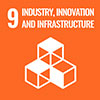Will robots take our jobs? A look at the labour market in Spain
The technologies based on artificial intelligence and robotics are one of the leading challenges facing us now with regards to the future of human work. The so-called Industry 4.0 is placing various business models in doubt, transforming training requirements for the system of production, and is progressively impacting on the distribution of profit.
The Spanish labour market provides a good example of how this new wave of technological change can have an impact on the levels and especially the structure of employment. A growing polarisation can be seen in labour demand and employment opportunities in accordance with educational levels and the various effects of labour imbalance, which are principally attributable to the characteristics of a dominant production model that is intensive in tasks of a routine nature but not particularly active in the incorporation of emerging technologies.
ODS



 Josep Lladós-Masllorens
Josep Lladós-MasllorensDegree and doctorate in Economic and Business Sciences, associate professor in Economics and Business Studies at the UOC, head of the inter-university doctoral programme in Business Administration and Management, and researcher with research group DigiBiz. His area of knowledge is applied economics and his research activity primarily focuses on the fields of international economy, economic geography and processes of business innovation.



